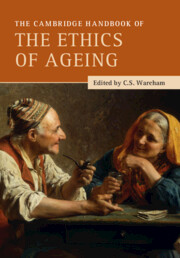Book contents
- The Cambridge Handbook of the Ethics of Ageing
- Cambridge Handbooks in Philosophy
- The Cambridge Handbook of the Ethics of Ageing
- Copyright page
- Contents
- Contributors
- Acknowledgements
- Introduction
- Part I Ageing and the Good Life
- Part II Ageing and Morality
- 8 Personhood across the Lifespan
- 9 African and East Asian Perspectives on Ageing
- 10 Special Obligations in Long-Standing Friendships
- 11 Forgiveness and Ageing
- 12 Life-Extending Treatments for People with Dementia
- 13 ‘Half in Love with Easeful Death’: Rational Suicide and the Elderly
- Part III Ageing and Society
- References
- Index
11 - Forgiveness and Ageing
from Part II - Ageing and Morality
Published online by Cambridge University Press: 23 August 2022
- The Cambridge Handbook of the Ethics of Ageing
- Cambridge Handbooks in Philosophy
- The Cambridge Handbook of the Ethics of Ageing
- Copyright page
- Contents
- Contributors
- Acknowledgements
- Introduction
- Part I Ageing and the Good Life
- Part II Ageing and Morality
- 8 Personhood across the Lifespan
- 9 African and East Asian Perspectives on Ageing
- 10 Special Obligations in Long-Standing Friendships
- 11 Forgiveness and Ageing
- 12 Life-Extending Treatments for People with Dementia
- 13 ‘Half in Love with Easeful Death’: Rational Suicide and the Elderly
- Part III Ageing and Society
- References
- Index
Summary
Ought ageing people sometimes to be prepared to forgive old offences that it would not have been (so) appropriate for them to have forgiven at an earlier date? The question is tackled in the framework of a narrative conception of human life that focuses attention on the changing impact of offences on victims as they advance through their life-stories. While concerns can be raised regarding the intelligibility or point of forgiveness of long-past offences given the changes that occur to people (both victims and offenders) over time, it is argued that forgiveness has a valuable role to play in tying up the moral loose ends in a life-narrative. Finally, the question is asked whether an offender may forgive herself for an offence committed against someone who is now deceased. It is proposed that although this would be out of order, an offender may legitimately forgive herself for the harm she has done to herself through her wrongdoing.
- Type
- Chapter
- Information
- The Cambridge Handbook of the Ethics of Ageing , pp. 146 - 160Publisher: Cambridge University PressPrint publication year: 2022

